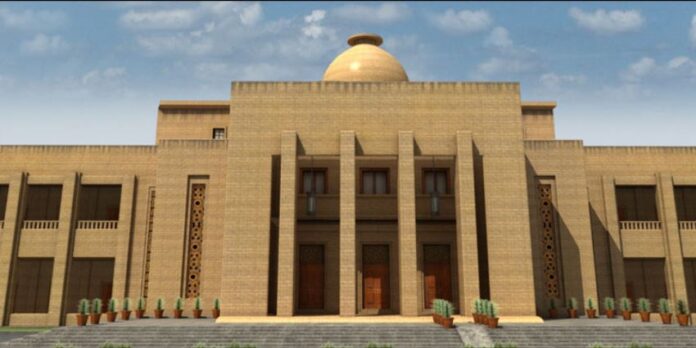Formal consultations between the Chief Minister of Sindh, Murad Ali Shah, and Leader of the Opposition, Rana Ansar, regarding the parochial caretaker setup are set to commence after August 11, according to sources privy to the matter. The conversations between government and opposition leaders will revolve around the establishment of the caretaker administration in Sindh following the dissolution of the parochial assembly. It’s anticipated that Chief Minister Murad Ali Shah and Opposition Leader Rana Ansar will engage in reflections to arrive at a collective agreement on the appointment of the caretaker Chief Minister for Sindh. This pivotal decision is anticipated to be made within a tight timeframe of three days from the dissolution of the parochial council. Sources have indicated that an sanctioned advertisement regarding the designated caretaker Chief Minister is likely to be made from the Chief Minister’s hearthstone on the evening of August 14. In the event of a implicit disagreement between the Chief Minister and the Opposition Leader over the selection of the caretaker Chief Minister, the matter will be appertained to a administrative commission for resolution. As per the indigenous protocol, both the Chief Minister and the Opposition Leader are assigned with reaching a amicable decision on the leadership of the interim setup within the span of three days.However, the administrative commission will step in to grease a resolution within the posterior three days, If agreement proves fugitive. Should the impasse persist indeed within the administrative commission, the responsibility of appointing the caretaker Chief Minister will fall to the election commission, which will be commanded to advertise the named seeker within the following two days. The careful unity of this process highlights the significance of a smooth transition of power during the interim period. As Sindh prepares for this critical phase, the cooperative sweats between government and opposition officers are necessary in icing the effective functioning of the caretaker administration until the parochial choices are held. The reflections over the caretaker setup are a abecedarian aspect of Pakistan’s popular process. During the interim period, when the peremptory government’s term ends and the medications for forthcoming choices are underway, the caretaker administration assumes a vital part in maintaining stability, upholding the rule of law, and easing the electoral process. The notion of a caretaker government is elevated in the Pakistani Constitution to insure a flawless transition between consecutive tagged governments. This interim arrangement serves as a safeguard against the abuse of power and coffers by the gregarious government, furnishing a neutral and unprejudiced administration that focuses solely on overseeing the choices and easing a fair and transparent electoral process. The selection of the caretaker Chief Minister is a delicate yet pivotal decision. The Chief Minister’s part extends beyond bare executive duties; they come the custodian of the popular process and play a vital part in icing a position playing field for all political parties. The caretaker Chief Minister must retain the rates of integrity, impartiality, and capability to effectively manage the affairs of the fiefdom during this critical period. As the discussion process between Chief Minister Murad Ali Shah and Opposition Leader Rana Ansar unfolds, the considerations extend beyond particular preferences. Factors similar as experience, equity, and commitment to popular values come into play. The chosen seeker must be someone who commands the respect and trust of all stakeholders, creating an terrain conducive to free and fair choices. The timeline for reaching a decision within three days of the parochial assembly’s dissolution underscores the urgency and graveness of the situation. The interim period is a sensitive phase where any detention or query can have far- reaching counteraccusations . A nippy and decisive selection process is essential to maintain political stability and public confidence in the popular process. The administrative commission’s implicit involvement in case of a disagreement reflects the checks and balances essential in Pakistan’s popular system. It ensures that no single reality holds unbounded power in the decision- making process. The involvement of a different group of representatives from colorful political parties enhances the legality of the final decision and minimizes the threat of bias. While the process may appear intricate and time-sensitive, it’s a testament to Pakistan’s commitment to popular governance. The nation’s popular trip is characterized by the elaboration of institutions, mechanisms, and processes that guard the principles of responsibility, translucency, and representation. The forthcoming advertisement of the caretaker Chief Minister’s name holds significance beyond executive liabilities. It symbolizes the adaptability of Pakistan’s popular spirit and the collaborative determination to uphold popular morals indeed during times of transition. The successful functioning of the caretaker administration hinges on effective collaboration between the government and the opposition. Their capability to put away political differences and prioritize the public interest reflects a mature approach to governance. The caretaker setup’s primary ideal is to insure a position playing field for all political parties, enabling them to contend on merit and ideas in the forthcoming choices. As Sindh prepares for this significant phase, all eyes are on the outgrowth of the consultations between Chief Minister Murad Ali Shah and Opposition Leader Rana Ansar. Their reflections will shape the course of the fiefdom’s interim administration and set the tone for a smooth and transparent electoral process. In conclusion, the process of opting a caretaker Chief Minister for Sindh is a critical corner in Pakistan’s popular trip. It exemplifies the nation’s commitment to upholding popular values and principles, indeed during times of political transition. The careful consideration, discussion, and agreement- structure among government and opposition leaders emphasize the maturity and adaptability of Pakistan’s popular institutions. As the nation embarks on this significant phase, the stopgap is that the named caretaker Chief Minister will uphold the ideals of fairness, integrity, and equity, icing a successful and transparent electoral process for the fiefdom.
Home Breaking News Caretaker Setup: Sindh CM and Opposition Leader to Initiate Talks After August...
